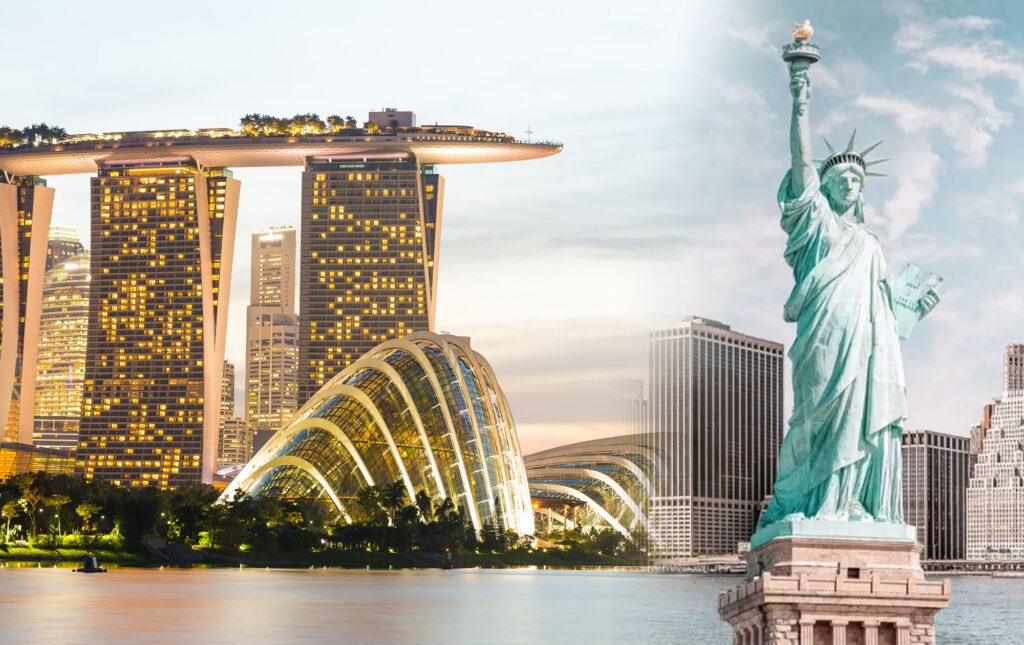

In the global pursuit of business opportunities, Singapore and the United States stand out as key destinations. Despite sharing robust economies and business-friendly environments, their divergent regulatory frameworks, cultural nuances, and market dynamics present distinct challenges and opportunities. In this article, we analyze doing business in Singapore vs United States through critical factors like legal landscapes, economic conditions, and cultural dimensions to guide businesses considering expansion into either Singapore or the United States. Our goal is to offer decision-makers a concise yet comprehensive insight into these unique business landscapes.
Economic Overview
With a population of 325 million, the United States stands as the world’s largest consumer market, with household spending contributing over 25% to global household consumption. The U.S. further extends business prospects through free trade agreements with numerous countries, providing companies with expanded access to millions of additional consumers. Investors are drawn not only by the sheer size of the market but also by the business-friendly environment and high quality of life.
On the other hand, Singapore’s economy thrives on manufacturing and services, constituting a fifth and two-thirds of its output, respectively. The nation’s natural connectivity to emerging markets in the region, positive labor-employer relations, a favorable tax regime, and a robust rule of law collectively contribute to its competitive advantage. This has fueled consistent and rapid growth for the Singaporean economy over the past four decades.
Business Environment
The United States ranks 6th, which contrasts with Singapore’s 2nd position, revealing differences in categories like starting a business and enforcing contracts, while the U.S. legal system operates with state-specific laws and federal precedence, including a jury system, whereas Singapore follows English Common Law, abolished trial by jury in 1969, and is globally ranked 13th for its rule of law, surpassing the U.S. at 19th.

Skilled Workforce
In both the United States and Singapore, women play a substantial role in the labor force, constituting 56% and 60%, respectively. The median age of the labor force in the U.S. is approximately 41.9 years, closely aligning with Singapore’s workforce, which has a median age of 43.
Moreover, educational attainment is noteworthy in both jurisdictions, with one in three adults in the U.S. holding a degree or higher, while a significant 54.6% of Singaporeans have received tertiary education. These demographic and educational insights underscore the diverse and educated nature of the workforce in both nations, contributing to the overall dynamism and competitiveness of their respective economies.
Business Language
English serves as the primary language for business in both jurisdictions, with Spanish emerging as the second most common language in the U.S., given its significant Spanish-speaking population.
Notably, Hawaii recognizes both English and Hawaiian as official languages, while Alaska designates English and 20 native languages as official. Similarly, in Singapore, English is the predominant language for legislation, regulation, and business, complemented by formal education in second languages such as Malay, Mandarin, and Tamil for most Singaporeans.
Ease of Business Setup
In terms of company registration, Singapore outpaces the U.S. with a swifter and more cost-effective process, requiring fewer procedures; for instance, initiating a business in Singapore costs approximately $308 compared to $750 in the U.S., and a medium-sized business in Singapore expends less time and resources, making five tax payments and spending 82 hours annually, while a similar U.S. business makes 11 payments and spends 175 hours on tax-related tasks.
Taxation System
This comparison explores the tax systems of Singapore and the United States, offering insights into their distinct approaches and implications.
Corporate Tax Rates
Singapore’s 17% corporate tax rate contrasts sharply with the U.S., where rates range from 15% to 35%, a crucial factor that enhances Singapore’s appeal for businesses seeking to maximize profits and minimize corporate income tax liabilities.
Personal Income Tax
Singapore’s personal income tax rates, notably with a maximum rate of 24%, present a more favorable scenario compared to the U.S.’s 39.6%, offering individuals a lower tax burden. This distinction becomes a crucial factor for businesses relocating key personnel or attracting top talent.
Tax Incentives and Exemptions
Singapore provides extensive tax incentives for businesses, including 75% exemption on the first S$100,000 of normal chargeable income for the first 3 consecutive Year of Assessment, while the U.S. offers federal research and development tax credits and state-specific incentives like the California Competes tax credit and Start-Up NY program, influencing location decisions for expansion or relocation.
Stability and Infrastructure
Renowned for effective governance and political stability, Singapore stands out as a secure business destination with robust information-communication infrastructure, a dependable political climate, a wealth of skilled professionals, and an advantageous location, making it attractive for businesses seeking stability and support. In contrast, the U.S. contends with bureaucratic inefficiencies, varying stability levels, and a more expansive yet less effective infrastructure system.
Business Visa Requirements
Singapore provides simpler application processes for various business-related visas, including EntrePass, Employment Pass, Singapore Investor Visa, and Short-Term Visit Pass, while the U.S. has more complex and restrictive visa requirements, influencing companies’ decisions on expansion or relocation.
A Snapshot Comparison | Singapore vs United States
Explore the critical facets of business in Singapore and the United States through this succinct table, unraveling corporate environments, workforce dynamics, tax structures, and competitiveness rankings. Gain indispensable insights to inform your business assessments and decisions.
| Aspect | Singapore | United States |
| Company Incorporation | Efficient and straightforward process | More complex system with varying state laws and regulations |
| Ease of Doing Business | World Bank Ranking: 2nd | World Bank Ranking: Varies by state |
| Global competitiveness: High | Global competitiveness: Moderate to High | |
| Enforcing contracts: 2nd | Enforcing contracts: 16th | |
| Tax payments and preparation: Fewer and Less Time | Tax payments and preparation: More and More Time | |
| Company Registration | Expedient and uncomplicated | Varies by state, potentially more time-consuming |
| Quicker and more cost-effective | Higher costs and longer timeframes | |
| Taxation Structure | Corporate Tax Rate: 17% | Corporate Tax Rate: 15% to 35% (Federal) |
| Favorable personal income tax rates | Complex tax filing procedures | |
| Attractive tax incentives | Various federal and state-specific incentives | |
| Labor Force and Workforce Quality | Highly skilled workforce | Highly skilled workforce |
| Tertiary-educated individuals: 54.6% | Quality of workforce depends on location | |
| Strict labor regulations | More flexible labor regulations | |
| International Trade and Investment | More free trade agreements | Fewer free trade agreements |
| Open foreign investment policy | More restrictive trade policies | |
| Pro-business environment | Strong foreign investment policies | |
| Strategic location in Asia | ||
| Government Stability and Infrastructure | Stable government, pro-business | Bureaucratic inefficiencies, varying government stability |
| Well-developed infrastructure | Larger but less efficient infrastructure | |
| Living and Working Conditions | Superior quality of life | Varied quality of life, depending on location |
| Lower cost of living | Higher cost of living in some aspects | |
| Better safety and security | Probable higher crime rates, less effective law enforcement | |
| Immigration and Visa Requirements | More straightforward and open | Complex and restrictive, varies by visa type |
| Business-related visas available | Stricter eligibility criteria | |
| Business Language and Cultural Differences | English as the main language | English as the main language |
| Cultural nuances in hierarchy and formality | Varied cultural approaches, more casual |
Where Premia TNC Comes Into the Picture
Discover a streamlined company formation experience with Premia TNC, designed for overseas companies entering Singapore or foreign individuals seeking incorporation. Our comprehensive services simplify the intricate process, providing guidance on incorporation and assisting in critical decisions, including the selection of a local director. Rely on our expertise for the seamless and successful establishment of your business in Singapore.
FAQs for Doing Business in Singapore vs United States
1. What about the ease of doing business?
Singapore consistently ranks high for ease of doing business, with streamlined processes and minimal bureaucracy, making it an attractive choice for operational efficiency.
2. How does Singapore's strategic location benefit international businesses compared to the U.S.?
Singapore's central location in Asia provides unparalleled access to key markets, making it an ideal hub for businesses aiming for global connectivity, while the U.S. may face more complexities due to its larger bureaucratic structure.






















